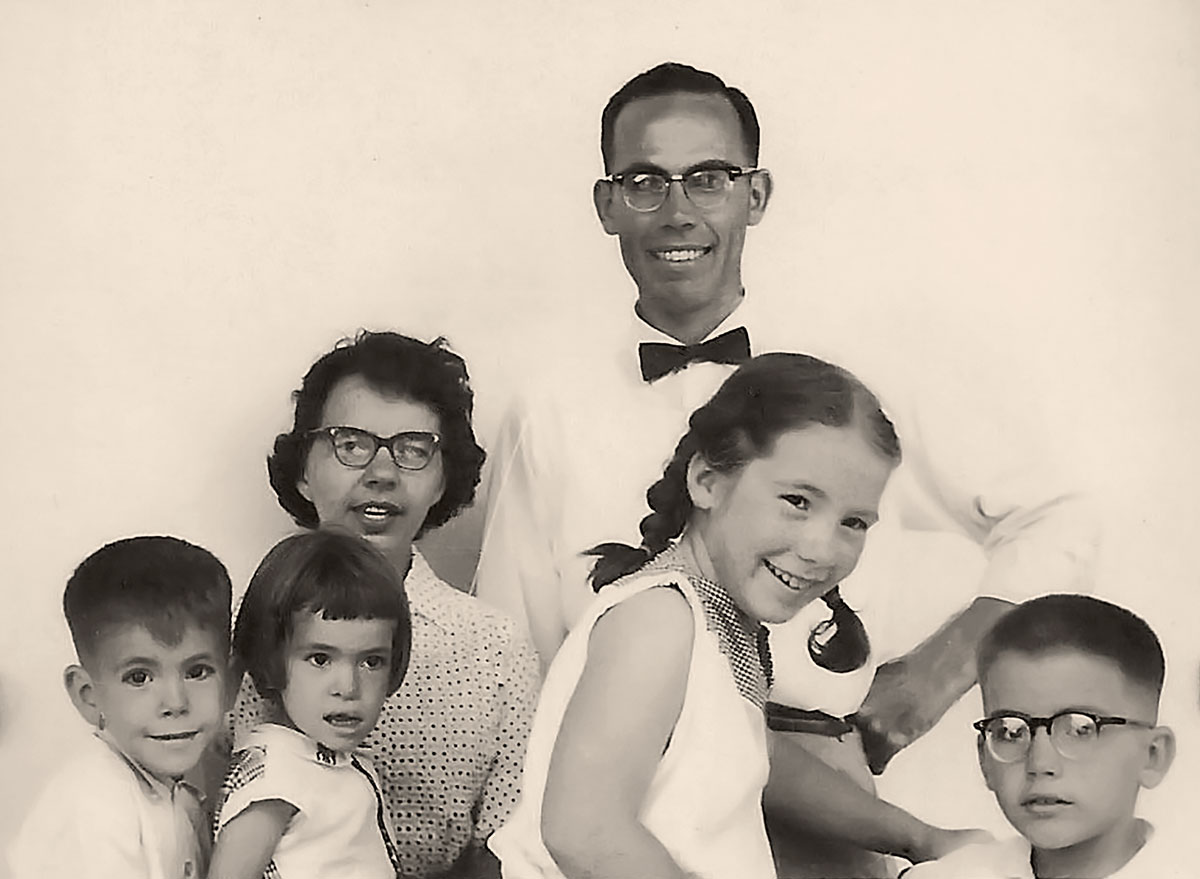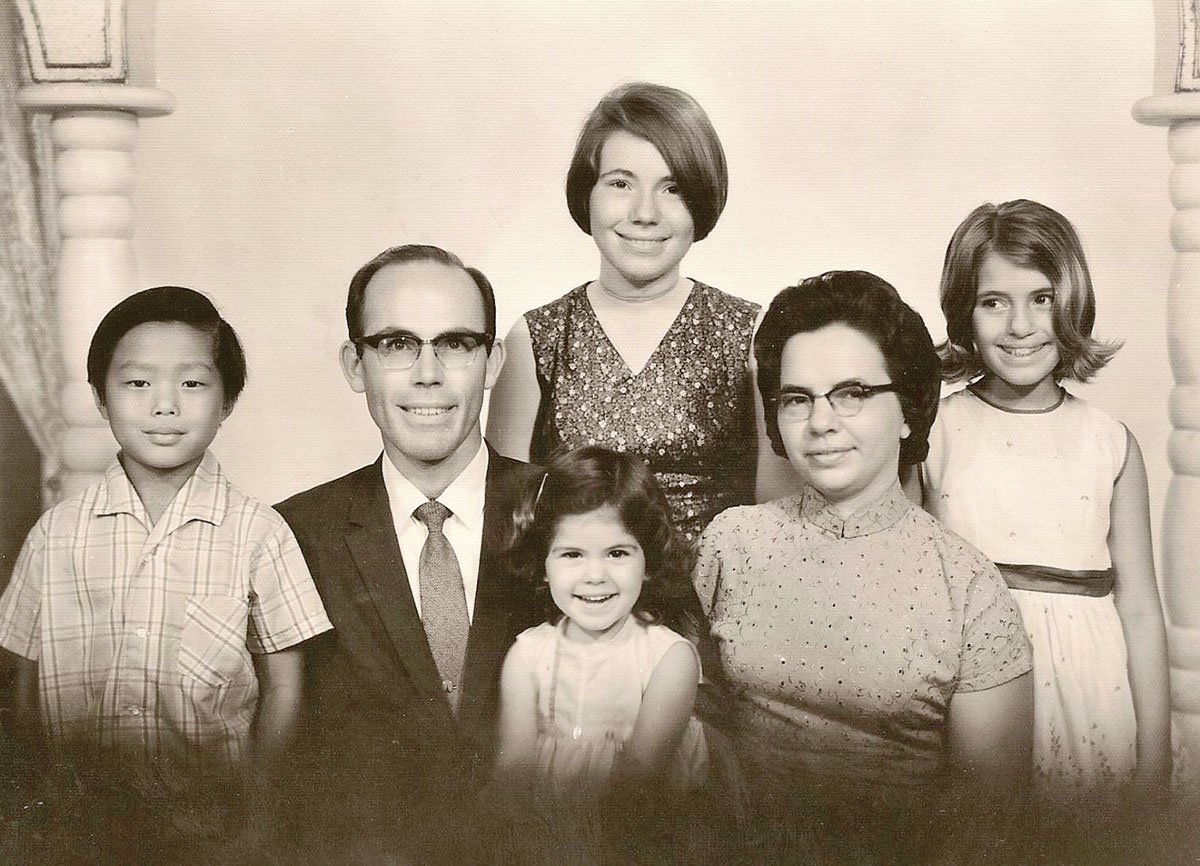Frogs, Birds and Squirrels【Parent-Child Reading Guide】
點閱次數:389Paul Stephen Alexander was born in the United States on January 3, 1928. He married Agnes Lucille “Lucy” Brown when he was 22, and graduated from Indiana University Bloomington in October 1958 with a PhD in biology. Both Paul and Lucy had the drive for missionary work from an early age. Merely a month after his graduation, the couple set out for Taiwan under the auspices of the Presbyterian Church of the United States taking their daughter, Anne Laura, and two sons, Stephen Carl and Philip Daniel, with them.
Paul was to hold a teaching position at Tunghai University. Having arrived in the middle of a semester, he managed to cover the full term’s material in half the time. The new surroundings were more challenging domestically. Potatoes, the Alexanders’ staple, were hard to get hold of. There was not modern kitchen yet; people made fires in their yards to cook at the outdoor hearth.
Besides teaching freshman English at the school, Lucy at first also gave lessons to families of the faculty. In time, Lucy felt too fatigued to go on. It turned out that she was pregnant with her fourth child. Dorothy Lucille was born in December 1959. There was a severe flood in central Taiwan earlier that year; by the year’s end, the roads and bridges had still not been fully repaired. Paul crossed Mt. Dadu on a borrowed motorcycle and delivered Lucy in labor to Changhua Christian Hospital. Dorothy had orofacial cleft, the two operations to alleviate which required the Alexanders to return to the States for one year and four months in 1960.
 Paul and Lucy with Anne, Stephen, Philip and Dorothy.
Paul and Lucy with Anne, Stephen, Philip and Dorothy.
Back in Taiwan, the Alexanders were allotted a different house. The family resided in that houseuntil Paul’s retirement and kept many animals, including a horse, there in its ample front and back yards. They nursed thirty rescued egret nestlings to maturity during the summer of 1965. After the egrets flew away, Stephen fell ill in August. A week later, the ten-year-old died of encephalitis. To make matters worse, Lucy and Paul also lost eight-year-old Philip to an accident the following month. Lucy’s parents paid a short visit to Taiwan to provide support to the grieving family. Many thought the Alexanders would follow the older Browns home, but Paul chose to stay in Taiwan for the forests and mountains, for the students and for what God willed him to do in the first place.
A younger daughter, Emily, was born to Lucy and Paul in October 1967. They also took in Gladys Aylward’s foster son, Gordon Philip, after the “Small Woman” had passed away in 1970. At Dorothy’s urging, the Alexanders decided to adopt Gordon. The adoption process was much more convoluted than they thought, for the little boy was a foundling with no papers. Paul could have taken a sabbatical in 1971 as Anne was about to go to college in the States. Stuck with the legalities, however, it was agreed that Lucy would take Anne, Dorothy, and Emily stateside, while Paul would wait for Gordon’s papers to come through and catch up with Lucy later.
 Paul and Lucy with Anne, Dorothy, Emily and Gordon.
Paul and Lucy with Anne, Dorothy, Emily and Gordon.
Half a year went by, and Lucy found little progress on Paul’s part. She had been looking after the three girls all by herself; years of untold grievances between man and wife finally broke out. Realizing the severity of the situation, Paul trusted Gordon to an acquaintance and immediately flew to the States. Lucy and Paul agreed to face the problems together and get marital counseling, which lasted well into their retirement. The experience also propelled the couple into introducing marriage encounter programs to the Taiwanese audience.
Paul retired to Montreat, North Carolina, in 1996, but remained active as a visiting scholar to Taiwan. He lived to 86 years old, and went Home with the Lord on June 17, 2014, in his home state, Indiana. A memorial service was held for him three weeks later at Tunghai’s Luce Chapel.
According to Dr. Chen Chin-Seng, Paul Stephen Alexander’s contribution to science and Taiwan is threefold: his instruction, his research and his service.
Paul’s specialty was in animal physiology, in addition to which he taught embryology, ontogeny, ornithology, herpetology, etc at Tunghai University. He had a certain command of Mandarin, but his courses were still conducted mainly in English. To know the students, he recorded their names as pronounced natively; having them schedule regular interviews at his office also helped. He could recall the name, interest, research topic, and relevant information of every one of his students over the years. He was as caring and patient with them as he was demanding.
Tunghai’s biology department emphasized understanding of local flora and fauna, among which Paul took an interest in the rice field frog (Fejervarya limnocharis). His pioneering research later turned to the East Asian bullfrog (Hoplobatrachus rugulosus) and toads. He also studied the red-bellied tree squirrel (Callosciurus erythraeus) and other small mammals in collaboration with National Taiwan University. His team obtained the initial batch of squirrels (11 males and 13 females) in Chushan, Nantou. The colony bred very well on the campus and became a welcome sight.
Paul advanced ornithological research in Taiwan by significant miles. His team was a participant of H. Elliott McClure’s SEATO-funded Migratory Animal Pathological Survey (MAPS), which operated capture-recapture stations across Southeast Asia from 1964 to the seventies to document the relationship between birds of passage and communicable diseases.
In 1970, Paul, with student Kang Kuo-Wei and Dr. Sheldon Severinghaus, published A Guide to the Birds of Taiwan, the first of its kind. The first bird-watching society in Taiwan was founded on the Tunghai campus in 1972 and was influential in popularizing ecotourism and wildlife studies on the island.
As a Christian, Paul believed that God made Heaven and Earth. At the same time, he did not think biblical teachings and the theory of evolution contradict each other. “They are each their own systems and serve to explain different things,” he said.
Lucy and Paul were missionaries. They served in the church, led Bible study groups, and coordinated with their colleagues. Academically, Paul often helped his students and fellow researchers polish their English-language papers. In this aspect, Paul was meticulous and deliberate. For the academics, time spent discussing the nuances of their arguments and wording with Paul was most likely the distance from a conference paper to an article published in an internationally renowned journal.
It is worth noting that the Alexanders dealt rather positively with their marital problems. Lucy designed a board game called The Appreciation Game to share what she learned on the way. Lucy obtained a master’s degree in sociology from Azusa Pacific University in 1984, and together with Paul founded Tunghai’s Family Wellness Center.
*The author would like to thank Yann Hsiao-Lan, secretary to Paul Stephen Alexander; and Dr. Chen Chin-Seng and Dr. Lin Yih-Ren, for their assistance during the writing of this book.